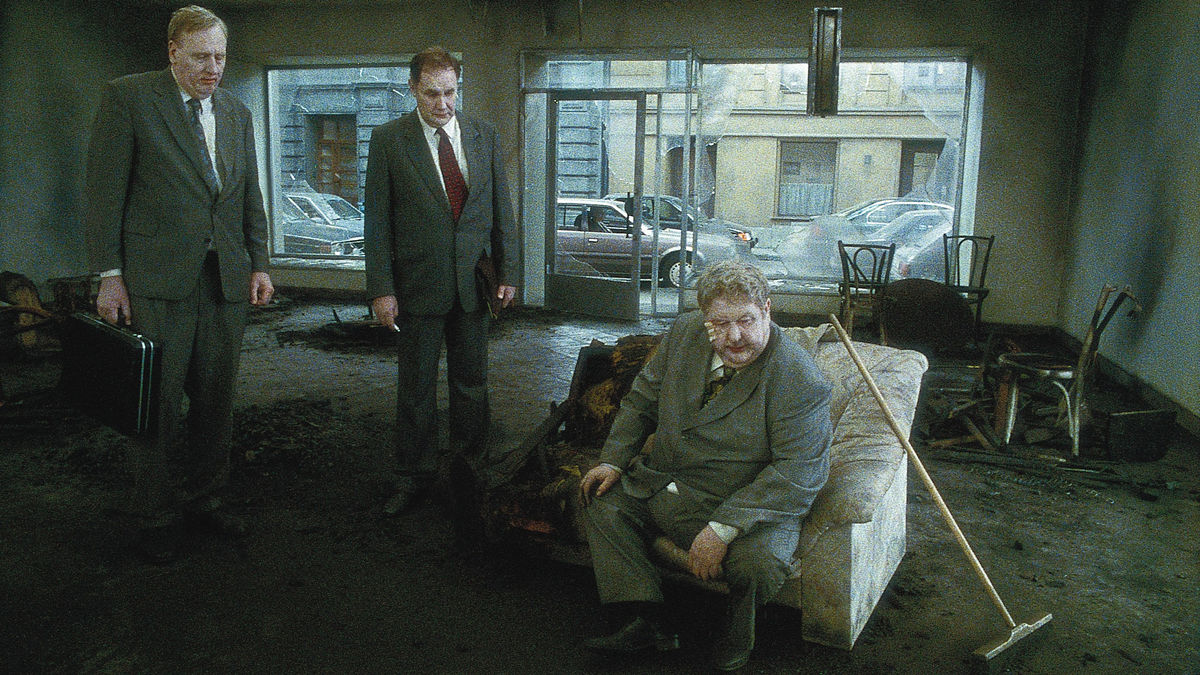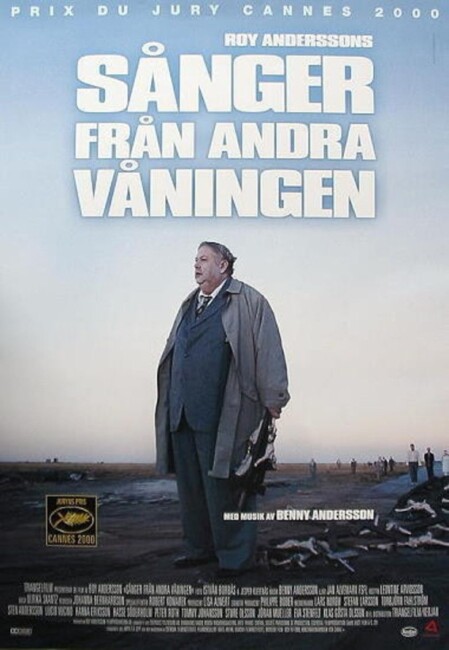(Sånger Från Andra Våningen)
Sweden/Norway/Denmark/France/Germany. 2000.
Crew
Director/Screenplay – Roy Andersson, Producer – Lisa Alwert, Photography – Istvan Borbas & Jesper Klevenås, Music – Benny Andersson, Special Effects Supervisor – Robert Komarek. Production Company – Roy Andersson Filmproduktion AB/Sveriges Television AB/Danmarks Radio/Norsk Rikskringkasting/Arte France Cinema/Societe Parisienne de Production SARL/Essential Filmproduction GMBH/Easy Films A-S ZDF/Arte
Cast
Lars Nordh (Kalle), Sten Andersson (Lasse Wigert), Torbjorn Fahlstrom (Pelle), Bengt C.W. Carlsson (Lennart), Stefan Larsson (Stefan), Peter Roth (Thomas), Tommy Johansson (Uffe), Lucio Vicino (The Magician), Per Jornelius (The Sawed Man), Klas Gosta-Olsson (The Speech Writer), Hasse Söderholm (100 Year Old Man)
Plot
Frustrated by his son Thomas who wrote poetry until he went mad and now no longer talks and had to be placed in an institution, Kalle burns his business down and then reels in shock at what he has done. A magician attempting to saw a man in half has the trick go wrong on him. Kalle is haunted by the ghost of his former business partner and others.
Songs from the Second Floor came with strong advance word. It tied with Wong Kar-Wai’s In the Mood for Love (2000) for the Jury Prize at Cannes and has a good many positive reviews from important art critics. It was seen variously as a masterpiece of “Swedish nihilism”, “a blackly humorous vision of the collapse of society”, “a chill parable reminding us of the weight of the people propping up the past” and a “a savage indictment of Western capitalism”. Contrarily, this author wondered if he were seeing the same film as these critics.
Songs from the Second Floor is certainly not the apocalyptic near End of the World science-fiction film some reviewers seemed to see it as. There is an inexplicable perpetual traffic jam – an image that was far better crafted into a vision of social breakdown in Jean-Luc Godard’s Weekend (1967) – and the Terry Gilliam-like image of a horde of civil servants running through the streets flagellating one another. However, a vision of social downfall this does not make.
There are ghosts and a reasonably effective scene where we realise that one person that Lars Nordh is talking to on a station platform is actually a dead business partner. You can sort of see all this parable about the weight of the dead but it still feels more like a load of weighty claptrap that has been read in over a slim and vague aspect of the plot.

Indeed, vague and slim are words that could be used to describe the whole film. There is no real plot – just several vignettes and interwoven fragments of stories, but most of these never amount to much. The film was directed with every scene shot in a single camera set-up with no cuts – an effect that is somewhat dramatically distancing. There is a lurking sense of black humour – the magician’s trick of sawing a person in half that goes wrong, the man who has just been fired refusing to let go of his boss’s leg as he is dragged down the hallway.
You feel that the film needed to push these scenes much further. There is a scene with a military centenarian who is being read an official commemoration and in the middle of it suddenly says “Give my regards to Goebbels” and gives a Nazi salute – and you keep expecting the scene to burst out into something incredibly blackly funny as the greeters try to ignore what is going on. Only it doesn’t. The whole film needed to come out somewhere near the hysterically deadpan blackness of something like Lars von Trier’s The Kingdom (1994) to make this work. Instead, it is a piece that sits at an oblique distance. Nothing ever emerges in terms of humour, drama or anything. This is one arthouse exercise that seems impossibly overrated.
Director Roy Andersson next returned with You, the Living (2007), which likewise offered up several plotless vignettes, each of which were shot using only a single camera set-up. This is a better film than Songs from the Second Floor, although its surrealism does no broach the overtly fantastic. Andersson next returned with A Pigeon Sat on a Branch Reflecting on Existence (2014) about birds viewing a series of surreal vignettes of human affairs and About Endlessness (2019), another series of occasionally surreal plotless vignettes.
Trailer here


